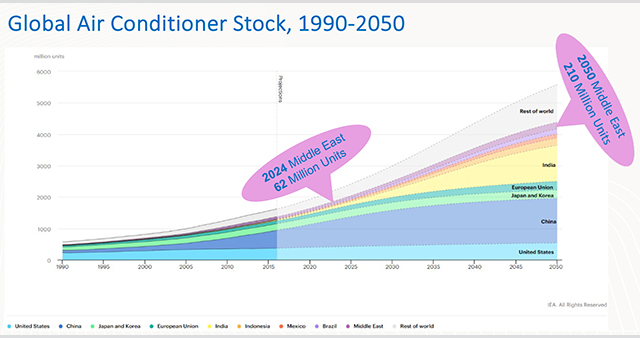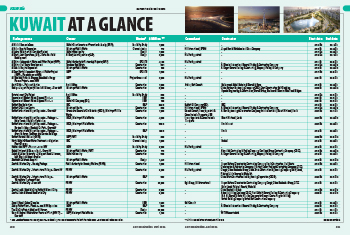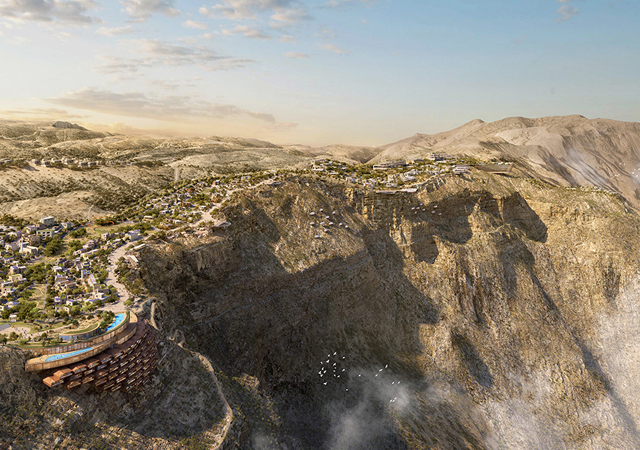
 Khalaf with the GP51 ... an innovative, fully-opening partitioning system from Reynaers.
Khalaf with the GP51 ... an innovative, fully-opening partitioning system from Reynaers.
Architectural aluminium systems supplier Reynaers continues to clinch some of the high-profile projects launched on the Gulf market, one of its latest being the Etihad Terminal under construction as part of the Abu Dhabi International Airport expansion programme.
The European company, which has its regional office in Bahrain, has completed the supply of material for the prestigious project, where installation work has crossed the halfway stage.
“We have supplied the profiles and the accessories for the unitised curtain-walling of the Etihad Terminal project that will feature 7,000 sq m of glass, which is using our CW86 system,” says managing director Ali Khalaf.
“The project required some customised profiles for its sloping façade, which has a free span of 8.5 m. Each glass panel measures 3.2 by 2.2 m and had to be 10 mm thick to ensure its integrity and performance. Because of the heavy profiles required for the 8.5 m span, an engineered structure reinforced with steel was created to support the weight,” he explains.
The Etihad Terminal is just one of the numerous projects that Reynaers has supplied to as it continues to meet some of the region’s demanding requirements. The large number of orders has meant a hectic five months since April this year for the company.
Other major projects in the UAE include:
• The Ritz-Carlton hotel in Dubai, where it has supplied its Eco hinged-window system with thermal breaks and Reynaers CW50 curtain – wall covering almost 21,000 sq m, which is currently being fabricated prior to installation on the project;
• The 22-plus storey Bayside residential tower, which called for 10,500 sq m of its CW50 curtain-walling system and the CP50 customised sliding doors;
• The Executive High for Damac Properties, for which Reynaers has supplied Eco and CW50 systems, which will cover an area of 6,500 sq m glass – the project is currently in the installation stage; and
• The Dolphin Park in Dubai.
In the Bahrain market, meanwhile, it has achieved major success at the Tala Island development – part of the $1billion Amwaj Islands in Muharraq – which has been a source of repeat orders. Reynaers completed delivery of its last shipment for the project last month. It is also in the process of supplying systems for the Al Jowhara Centre near Salmaniya Medical Centre. New orders have also been secured by the company for the 35-storey Villa Vista building in Mahooz; the Royal College of Surgeons in Ireland-Medical University of Bahrain in Muharraq – both of which will feature its CW50 curtain-walling; and the new administration building for the Ministry of Electricity and Walter, which will be supplied with curtain-walling, hinged doors and sliding windows.
Elsewhere in the Gulf, its latest successes in Qatar include the Al Alawi tower and the Qatar Real Estate Investment Company office building, which is using its new CW60 curtain-walling system that was launched on the market this year. This system was previously supplied for projects as a special solution.
In Kuwait, Reynaers systems have just been used on the 10-storey Holiday Inn, while installation work is in progress on the 20-storey Al Motairy tower along the Arabian Gulf coast. The company is now supplying its CW50 curtain-walling and thermally-broken hinged windows with concealed openings as well as lift-and-slide doors for the Lulwa Tower.
Reynaers has managed to break into the Saudi Arabian market with the supply of its curtain-walling for the 12-storey Al Sahamiya Tower in the Eastern Province.
Further afield, it has also achieved success in India, where its CS59-PA hinged windows with concealed openings have been used for the Renaissance Mumbai Hotel and Convention Centre. Other projects include the Dead Sea Holiday Inn in Jordan; and the Arab European University and a highly unusual full-glazed pyramid-shaped mosque in Syria.
Apart from a healthy order book both in the region and internationally, the Belgium-headquartered Reynaers Aluminium has introduced a new visual identity supporting its profile as one of Europe's leading providers of innovative and sustainable architectural aluminium solutions.
With offices in 27 countries and exporting to more than 50 countries on the five continents, Reynaers Aluminium wants to reinforce its growing market position by developing a stronger branding. The new logo and visual identity reflect Reynaers’ customer-focused core values as well as the company’s product qualities.
This apart, to ensure that the company maintains its competitive edge, Reynaers has introduced two other new systems in addition to the CW60 curtain-walling. These include the innovative GP51 partitioning system, which was launched in the region at gulfBID 2007, the region’s premier construction, interiors and furniture expo held in Bahrain during May this year. The system can be used for balconies, restaurants and a host of other applications.
“The innovativeness of the fully-opening partitioning system is simply amazing,” says Khalaf.
The GP51 comprises glass windows or doors that slide through aluminium frames at the top and the bottom with no vertical struts. The system, which can be fitted in a straight line or at a 90-degree angle, allows people to immediately convert a fully covered area to an open one by merely sliding the doors, says Khalaf.
Reynaers has also recently launched a slim hinged window system called CS24, where the frame is only 19.5 mm wide. The thermally-insulated three-chamber system combines ultimate elegance with enhanced strength and ease in production. Its slender exterior contours and glazing beads on the outside give the system a steel look design.
To reinforce its position in the region, the Bahrain-based operation has been honing its skills to stay ahead in the market. “Most projects nowadays require customised solutions. To enable us to customise profiles right here in the region, without having to rely on input from Belgium as we have been doing so far, we has sent one of our technical engineers on a two-month training course with the project teams at our head office. In addition, a technical engineer from Belgium will now be based in Bahrain to strengthen our local expertise,” says Khalaf.
While Khalaf is enthused by the trend in the construction sector towards maximising the use of glazing in buildings, he points out that the industry is facing a severe shortage in the supply of glass. “While there are a number of glass processing lines being set up in the region, the current demand is such that the glass industry cannot cope with the demand. However, at the end of the day, it is the fabricators that are blamed when they fail to deliver on time,” he says.
Commenting on trends in the construction industry, Khalaf points out that sun screening systems are gaining in popularity, with the industry making increasing demands for systems with elliptical or extra-wide louvres – as was the case with the RUF car showroom in Bahrain for which Reynaers supplied 650-mm-wide louvres.
Another trend is towards larger glazing panels and Reynaers has proved that it can certainly rise to the occasion, as amply demonstrated by its work at the Etihad Terminal.





















_0001.jpg)


.jpg)
















.jpg)








.jpg)








